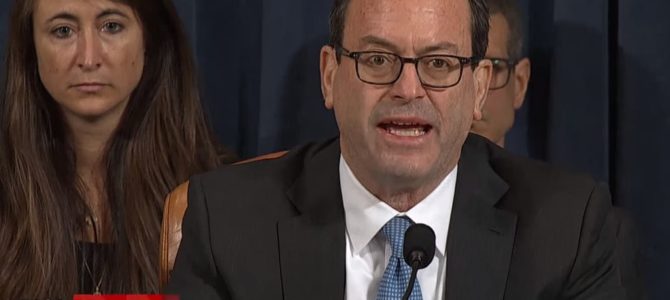
House Judiciary Committee Democrats’ pre-planned Kafkaesque decision to allow their attorney and advocate, Barry Berke, to both testify as a witness and then change roles mid-hearing to become an advocate and cross-examine the Democrats’ adversary, Stephen Castor (minority counsel for the intelligence committee), is totally unprecedented in American jurisprudence. It was an unprecedented violation of fundamental rules of fairness. It also was an ambush, pure and simple.
Give judiciary Chairman Jerry Nadler and his crowd credit for one thing: creativity. After the hearing I asked a lawyer friend, a tried and true Democrat, if he had ever heard of anything similar being done outside of the Soviet Union, North Korea, or a similar totalitarian state. He first said, “No,” then quickly added, “I can’t picture even them doing this because it is so obviously unfair and stupid.”
A comparison with the rules governing lawyers and trials shows the impropriety. The closest analogy may be the ethical rules governing lawyers. Those rules squarely forbid Democrats’ outrageous conduct. The American Bar Association’s Rule of Professional Conduct 3.7 provides (in the absence of exceptions that are not applicable here): “A lawyer shall not act as advocate at a trial in which the lawyer is likely to be a necessary witness…”
Although the impeachment hearings are not a trial, they are—or Democrats try to pretend that they are—a quasi-judicial proceeding. Indeed, Nadler assured the American people at the outset that lawyers would be called to present evidence. Thus, the starting point in any consideration of the Nadler charade is to understand clearly that no court in the United States would permit Democrats’ tactic of designating a witness to testify and then allowing that witness to conduct a surprise cross-examination of an attorney for the other side.
The Official Comments to the ABA’s ethical rules point out several reasons Rule 3.7 is necessary to ensure fairness. The first is to avoid a conflict of interest. The ABA’s Official Comment [1] to Rule 3.7 provides: “Combining the roles of advocate and witness can prejudice the tribunal and the opposing party and can also involve a conflict of interest between the lawyer and client…”
The potential for a conflict of interest was manifest throughout Berke’s testimony. As the ABA’s Official Comment [2] explains, as a fact witness, he was “required to testify on the basis of personal knowledge.” His obligation as a fact witness obligated him to “tell the truth, the whole truth and nothing but the truth.”
His employers, the Democrat committee members who hired him, might take a different view of the facts. But as a fact witness he was ethically and legally obligated to tell the truth. We saw this repeatedly when he made statements and quickly agreed with all leading questions that the Democrats posed to him.
Maybe he was telling the whole truth and nothing but the truth; maybe he was not. But Berke most decidedly had a potential conflict of interest that raises the question, which is why Rule 3.7 forbids him from serving at trial both as an attorney advocate and as a witness.
Berke’s dual role as a cross-examining advocate also causes massive confusion. As an advocate, Berke “is expected to explain and comment on evidence given by others.” As the Official Comment [2] explains,
The tribunal has proper objection when the trier of fact may be confused or misled by a lawyer serving as both advocate and witness. The opposing party has proper objection where the combination of roles may prejudice that party’s rights in the litigation. A witness is required to testify on the basis of personal knowledge, while an advocate is expected to explain and comment on evidence given by others. It may not be clear whether a statement by an advocate-witness should be taken as proof or as analysis of the proof.
This consideration is especially important when the target audience is not just the committee members but includes millions of Americans watching the proceedings on TV and the stakes are whether a duly elected president will be removed from office. Indeed, because Democrats are attempting to use the hearing to persuade American voters to support their impeachment efforts, the considerations about avoiding prejudice to the tribunal apply with equal force to refrain from foisting prejudice and confusion upon the voting public.
Berke was “expected to testify on the basis of personal knowledge.” Despite that, his only knowledge of the facts was—like virtually all witnesses called by the Democrats—based upon what he had heard or read from others. His “testimony” really was an advocate’s argument, but the average voter watching on TV is no doubt confused about whether his statements should be taken as proof of facts or as his opinions that depended upon proper proof for any validity. Democrats’ intentional foisting of this confusion in a matter this serious is inexcusable.
Berke’s dual role prejudiced Republicans in another way. Based upon the rules of the House, the committee rules, and more than 200 years of American jurisprudence, there was no way that Republicans could have anticipated this unprecedented trick. It clearly was intentional.
Democrats and Berke prepared all weekend for this ambush, no doubt rubbing their hands in gleeful anticipation. Had they had disclosed their unprecedented intent to the Republicans, the committee’s minority counsel could have prepared a cross-examination of Berke and of Castor that addressed these and other issues raised by Berke’s precedent-shattering ploy.
But their ambush was expertly executed. In the words of former Democrat Senate Majority Leader Harry Reid, when asked about his lies about Mitch Romney’s tax returns, “It worked, didn’t it?”
Here I’ve focused on the unfairness and improprieties of just this single issue. It barely scratches the surface of Democrats’ misconduct and unfairness during the impeachment attempt. The American people, however, should be under no misconception about the broader picture: We are witnessing an attempted coup in progress.









